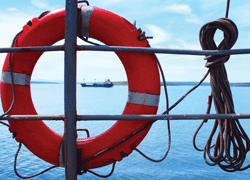
05 August 2015
Auckland ferry operator Fullers and the Interislander are among commercial operators looking at signing employees into the industry’s new maritime qualifications when they come into force with the new licensing requirements at the start of 2016.
The industry’s main associations, the Shipping Federation and Marine Transport Association (MTA), have worked closely with maritime industry training organisation Competenz to develop the New Zealand Certificates which replace the existing National Certificates. Regulators and the industry will continue to recognise both sets of certificates as valid and relevant.
Industry heavily involved in designing new qualifications
Industry Manager (Maritime) Richard Cowper says participation from the wider industry had played an important part in helping the Competenz team understand the technical and commercial skills employees need to work efficiently and safely at sea.
“The Shipping Federation and MTA have been involved, representing their members in developing the structure and content of the new qualifications. Maritime New Zealand (MNZ) played a crucial part as the regulator, as did the maritime schools.
“The result is a set of domestic and international qualifications that will help operators invest in, lift and standardise the skills of people in the industry. The links to national and international licensing regimes are absolutely clear, and that will help New Zealand operators and seafarers maintain the good reputation they hold with the New Zealand public and internationally.”
Updating the qualifications has not always been plain sailing. “We’ve seen a few delays and that’s been frustrating for operators,” says Richard. “The regulatory environment’s been changing rapidly, and we needed to make sure our New Zealand Certificates and Diplomas were consistent with the new SeaCert licensing framework and STCW-10 requirements.”
Benefits of nationally and internationally recognised qualifications
Richard says nationally and internationally recognised qualifications benefit everyone in the industry.
“If you’re a student or employee who enrols in a qualification, you can be confident it will meet the requirements of the maritime licence you want to hold. It shows MNZ and employers you’ve reached a standard that’s recognised across the country – and the world.
“If you’re an operator who takes on someone with a qualification and the associated licence, you get a double guarantee that they can do what they say they can do. They’ll have the skills they need to be productive and work safely. Investing in training your team is a great way to promote employee loyalty too”.
About the new qualifications
Competenz will launch 15 New Zealand Certificates and Diplomas from 1 January 2016. Together these certificates form a path of learning over many years, leading to many career opportunities.
As the accompanying table shows, four of the certificates support New Zealand’s domestic licensing requirements and are linked to MNZ’s competency frameworks. The entry-level qualification is aimed at new crew and the intermediate qualification ties into MNZ’s Qualified Deck Crew (QDC) competencies. Both certificates have a strong focus on basic skills and safety. The two skipper qualifications build the specialised skills needed by skippers operating vessels within the restricted or coastal and offshore operational limits.
Eight certificates and diplomas are available to support licences covered by the International Maritime Organisation’s STCW-10 and STCW¬-F licensing requirements. These include passenger services crew, deck crew, skippers, mates and masters. The qualifications also make allowance for the requirements of fishing and yacht operations. Each qualification refers clearly to the relevant STCW competency tables.
The three marine engineering qualifications are the least changed and continue to tie into the requirements of MEC 6 to MEC1. The qualification for electro-technical officers, a first for New Zealand, was added in response to a global demand for people with these skills.
With the qualifications approved by the New Zealand Qualifications Authority (the government agency that manages New Zealand’s national qualifications), the Competenz team is now working with operators to prepare to enrol learners. This includes agreeing how to support learners and operators through the training, and the formal review process that will confirm learners have gained the skills they need.
More information
Richard Cowper, Competenz Industry Manager (Maritime) 021 814 552 | 09 539 9860 | r.cowper@competenz.org.nz
Richard will be talking about the new qualifications at the Maritime Transport Association Conference (Auckland, 2-4 September).



